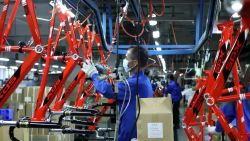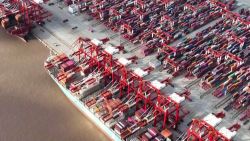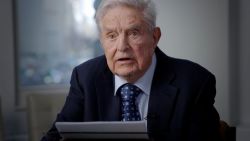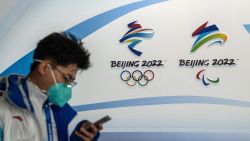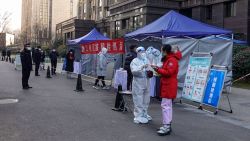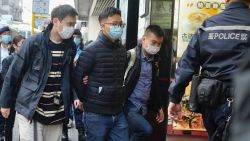Before the pandemic, Hong Kong was an aviation hub attracting pilots from around the world.
Two years on, pilots at flagship airline Cathay Pacific are so exhausted and depressed from working under one of the world’s strictest quarantine regimes that some are reaching a breaking point.
Once known as a premier employer, the Hong Kong-based airline is now grappling with plummeting morale, a spike in resignations and mounting frustration as staff undergo arduous self-isolation measures, according to two Cathay pilots, who spoke with CNN Business on condition of anonymity for fear of reprisals.
“The morale is all gone. All gone,” said the first Cathay pilot, who has worked at the airline for several years. “Everybody’s angry.”
Like most airlines, Cathay Pacific (CPCAY) was hit hard by the Covid-19 pandemic as travel collapsed around the world last year. The carrier was forced to dramatically slash its flight schedule, at one point seeing passenger levels tank 99%.
But the challenges it faces as aHong Kong-based business may be the toughest in the industry.
The city, along with mainland China, is one of the last places in Asia still adopting a “zero Covid” strategy. While the insistence on stamping out any trace of the virus means the city is largely Covid-free, the policy also means Hong Kong is home to one of the longest quarantines on Earth. And the recent emergence of Omicron, the new coronavirus variant, threatens to further upend aviation and could lead to stricter controls.
The existing rules have reignited debate on whether its approach to the pandemic is ultimately hurting the city — particularly as other places begin to adopt a “living with Covid” playbook.
The first Cathay pilot said they recently spoke with four colleagues who quit on the same day, and that resignations were noticeably up compared to years prior. They said “a lot” of colleagues were seeking help to deal with mental health issues.
In a statement to CNN Business, Cathay said that “we fully acknowledge that these rules and the length of time they have been in force are placing a burden on our aircrew, all of whom have been exemplary in their conduct and professionalism throughout this difficult period.”
“Up to the end of October our resignation and early retirement rate has been on par with historical data,” it said.
To be sure, others in the aviation industry are feeling the pain in the Chinese city.
In November, FedEx (FDX) said it would shut down its crew base in Hong Kong entirely and relocate pilots away from the city. In a statement, the company cited “pandemic requirements in Hong Kong.” And last week, British Airways (BA) temporarily suspended flights to Hong Kong after one of its crew members tested positive for Covid-19 on arrival to the city.
This week, Swiss International Airlines has also suspended flights to Hong Kong, saying it is “in response to a tightening of the local quarantine provisions for crew members arriving in Hong Kong.” The carrier says it will closely monitor the situation “with a view to these services’ resumption.”
The ‘closed loop’
Since the pandemic, Cathay has adopted so-called “closed loop” flights, mostly for those traveling to countries designated by Hong Kong as “high risk,” such as the United States, India and the United Kingdom.
This typically means that pilots fly out for several weeks, cannot leave their hotel rooms upon arriving at their destination, and return to hotel quarantine in Hong Kong for another two weeks, according to the Cathay pilots who spoke to CNN Business. That is then followed by a further two weeks of isolation at home, they said.
The arrangement is voluntary. Crew who don’t participate can be assigned other routes, such as ones involving cargo or which go to “low-risk” destinations, according to the pilots. Some do not have the chance to fly at all.
But currently for the “closed loops,” “they’re not getting the volunteers,” according to the first pilot.
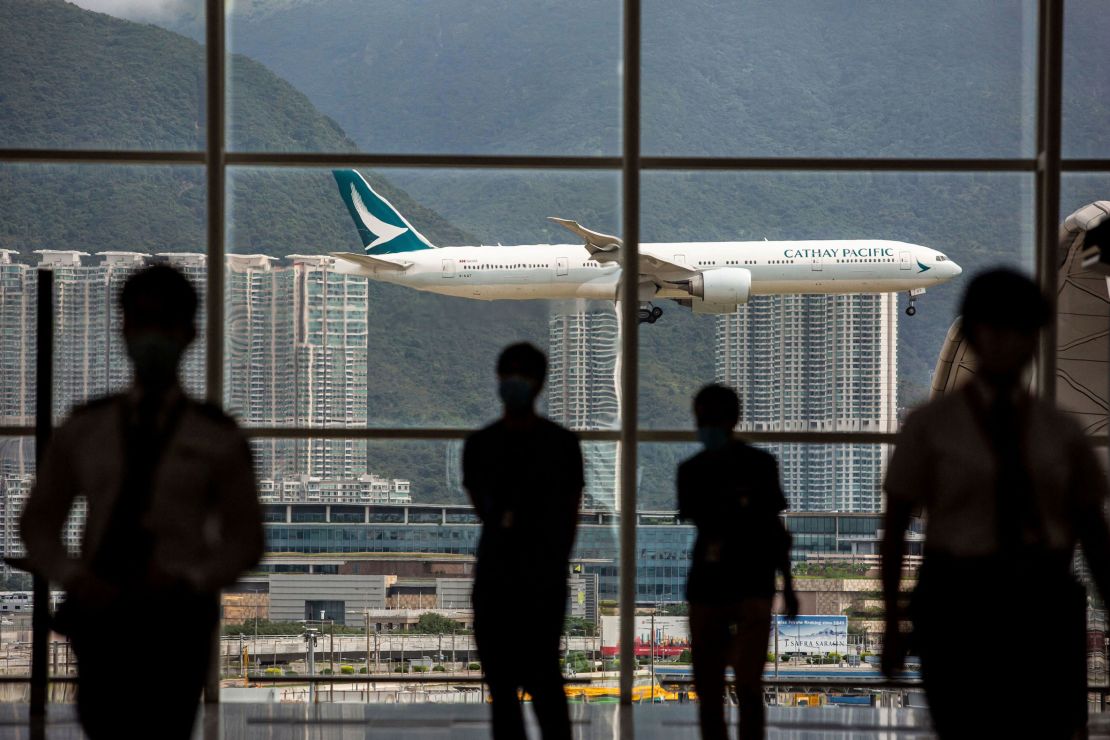
Last month, Cathay said it had to cancel some flights in December, saying that “operational and travel restrictions … continue to constrain our ability to operate flights as planned.”
The company did not comment on whether staffing shortages had played a role. It did, however, say Monday that “in view of the latest travel restrictions, including the government’s quarantine classification for many of our major markets, and the subsequent operational constraints, our ability to operate flights as planned continues to be affected.”
In recent days, Hong Kong has reclassified more than a dozen countries as “high risk,” including South Korea, Germany and Singapore, leaving many passengers scrambling over their holiday plans.
The “closed loops” for such destinations are so grueling, according to the pilots, that Cathay has now set up emotional support groups for participants.
“I know a lot of guys who pulled out of it. They just say, ‘We’re done doing closed loops,’” said the first pilot. “After one or two of them, they’re just like, ‘Yeah, I’m done. I can’t do this anymore.’ They just get tired of quarantine or isolation.”
Pilots outside the “closed loop” program are losing patience, too.
Another Cathay pilot, who has worked at the airline for more than a decade, said of the quarantine rules, “I think for me, one way to sort of describe it is: Imagine somebody came along once a day and just slapped you in the face.”
“At the start, you’d just be like, ‘Oh, this is a bit annoying.’ And after a month, you would just be like, ‘Oh, this is starting to get a bit irritating now.’ And after 18 months or more, you’d just be like, ‘I’ve just had enough.’”
Like staff at many airlines, all Cathay flight crew are fully vaccinated. And the carrier has said it is simply complying with government restrictions in Hong Kong, which still require most travelers to quarantine for up to three weeks, even if they are inoculated.
Cathay has also been praised for sending its employees supplies during quarantine in some cases, such as refrigerators and air mattresses, as well as care packages. The airline told CNN Business that “we have done all we can to support our teams by managing what we can control, such as periods of free time after closed loop roster patterns, financial incentives and options to take extended leave of absence.”
The company also noted a recent incident in Frankfurt, in which three pilots were found to have breached isolation rules, caught Covid-19 and were terminated.
This “has affected current sentiment; however, we fully expect to be a competitive employer of both local and international talent in the long term,” the airline added, adding that it has plans to employ several hundred pilots in the coming year.
“This situation is not unique to Cathay Pacific as the aviation industry worldwide has been hugely affected by this unprecedented global pandemic.”
The company also added that it holds biweekly calls to discuss concerns, in addition to the pilot support group and Cathay’s official employee assistance program.
But “the problem is, there’s no light at the end of the tunnel,” said the second pilot, describing the experience as inhumane. “Even people in solitary confinement get half an hour, an hour of exercise a day, whereas we’re not allowed out of the hell hotel room.”
Sliding morale
Hong Kong’s rules don’t appear to be lifting anytime soon. And at Cathay, morale was already sliding before the pandemic.
In 2019, the company became divided during pro-democracy protests in Hong Kong. Chinese state media slammed Cathay workers taking part in illegal demonstrations and the airline terminated several employees over the issue. During the turmoil, the carrier also lost its CEO and chief commercial officer.
Another sticking point for staff was a sweeping restructuring that took place in October 2020, which involved mass layoffs, significant pay cuts and the shutdown of regional airline Cathay Dragon.
The pilots who spoke to CNN Business say that many who stayed on took cuts of between 30% and 60% to their compensation as the airline slashed costs.
The second pilot said that his children were forced to change schools after the move, because he couldn’t afford the tuition fees anymore.
He argued that Cathay could have made the pay cuts temporary, instead of permanent, saying that other airlines in similar positions had done more to protect their employees.
“There’s got to be more you can do,” he said. “We’ve had permanent sweeping changes that will never be … the same again.”
In its statement to CNN Business, Cathay said that the reorganization “was to protect as many jobs as possible, whilst meeting our responsibilities to the Hong Kong aviation hub and our customers.”
“Pilots were asked to consent to new conditions of service to better align incentives to productivity, and some 98.5% of the pilots did,” it noted. “These are competitive contracts, which enable us to continue to recruit and retain the very best people to be our pilots as we seek to survive and rebuild our business.”
An industry shift
Hong Kong authorities have defended their quarantine rules, pointing to the success the city has had in keeping out infection. The city of more than 7 million has recorded just over 12,000 total cases and 213 deaths since the start of the pandemic.
In September, Hong Kong Commerce Secretary Edward Yau told CNN Business that he understood the frustration held by companies, but emphasized the lack of coronavirus cases in the city.
“Let’s not lose sight. This is hard-earned,” Yau said at the time. “We must maintain this high level of vigilance.”
But as the pandemic nears the two-year mark, companies are increasingly under pressure to help ease staff fatigue.
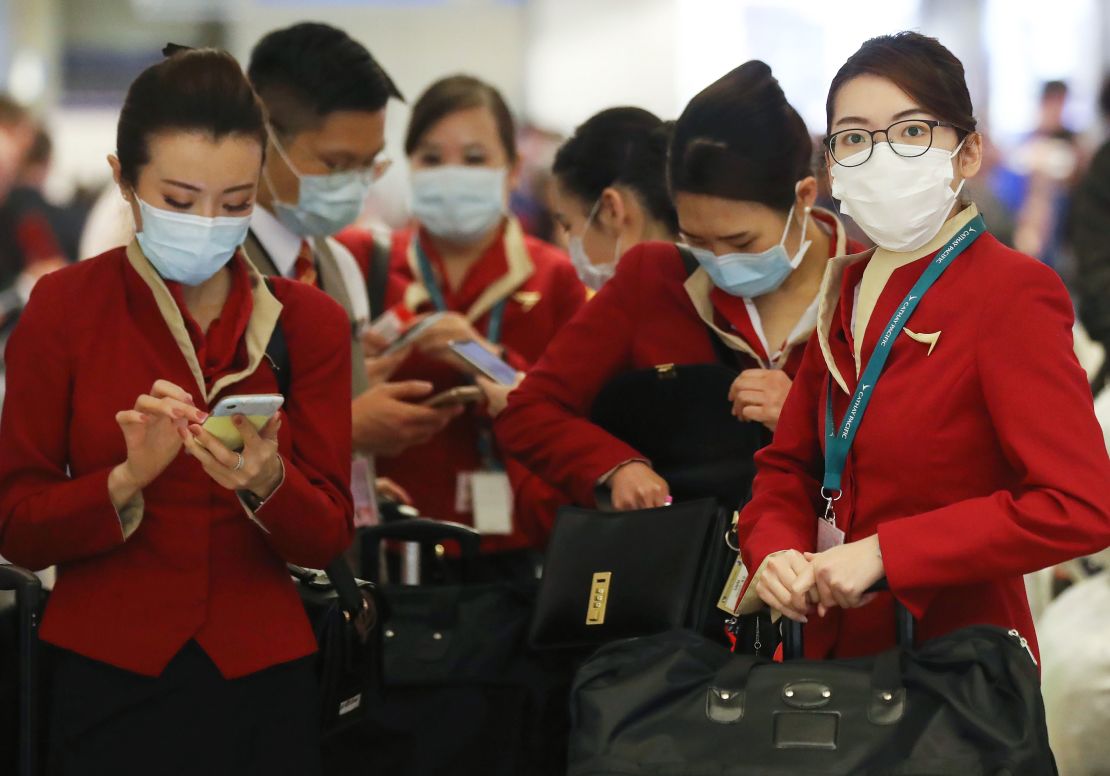
Last month, Cathay said that it would consider letting some of its pilots live abroad temporarily, in an “extended roster” plan that would allow them to be stationed outside Hong Kong for two to four months.
“We are exploring options and seeking expressions of interest from pilots,” the company said in a statement.
It added lastweek that the program “is intended as a possible fallback plan and is not considered to be a long-term solution to the current challenges Cathay Pacific is facing.”
The British Airways incident involving a crew member who tested positive for Covid-19, meanwhile, reportedly forced other airline staff to go into quarantine at a government facility, though BA declined to confirm or comment on how many employees were affected.
“We’re supporting crew who are currently isolating in Hong Kong,” a BA spokesperson said. “We have made the difficult decision to temporarily suspend flights to Hong Kong while we review operational requirements.”
And the move by FedEx to shut down its crew base in Hong Kong has raised questions about the city’s role as a logistics hub. The decision was made “as there is no clear timeline when life may return to normal in Hong Kong,” Robin Sebasco, FedEx’s system chief pilot, wrote to employees in an internal memo, according to the South China Morning Post.
CNN Business could not verify the memo, and FedEx declined to comment about that report. In its statement to CNN Business, the company stressed that it would “continue to maintain its operations in Hong Kong, which is vital to our Asia Pacific and global network.”
Cathay, too, has said that it is “fully committed to protecting and enhancing Hong Kong’s aviation hub status … despite the challenging circumstances presented by the pandemic.”

Some critics have already said that as travel restrictions continue, the former British colony is losing its luster as a global business center, though the government maintains such measures are needed to protect public health.
Brendan Sobie, an independent aviation analyst and consultant, said there is also “concern” for the city’s future as an international aviation hub.
“This is not just about the pilot or crew quarantine issues,” he told CNN Business, noting that “these issues have been happening virtually all year and will likely persist for some time given Hong Kong’s ‘Covid zero’ policy and the emergence of a new variant.”
Sobie predicts that the Omicron variant will set back the recovery for aviation “throughout Asia and globally.”
“But the rival hubs are still in a much better position overall than Hong Kong,” he said, adding that “other international hubs in the region were starting to recover in recent weeks while Hong Kong was still stuck at minuscule traffic levels.”
“It could be very difficult for Hong Kong to compete from a hub perspective for some time, and there could potentially be permanent implications.”
— Teele Rabane and Wayne Chang contributed to this report.




